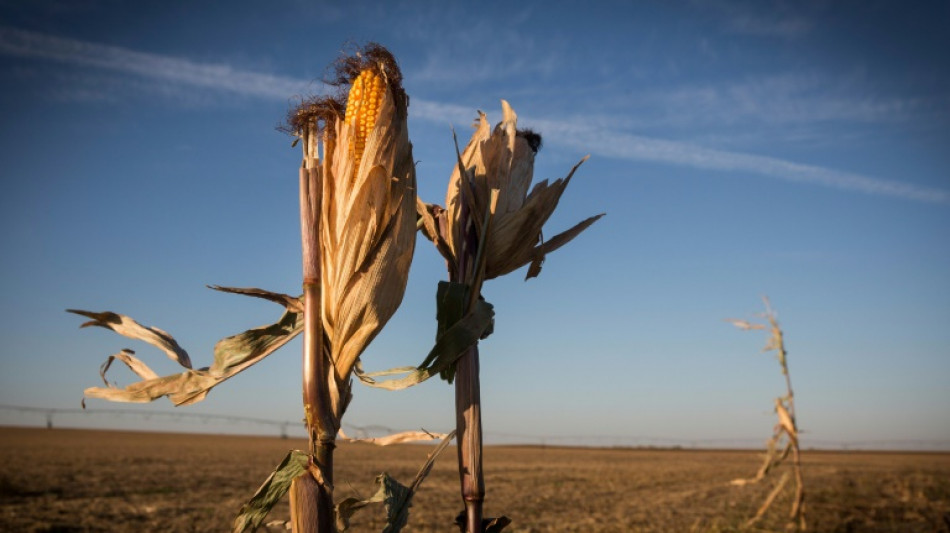
-
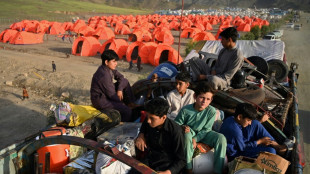 Fleeing Pakistan, Afghans rebuild from nothing
Fleeing Pakistan, Afghans rebuild from nothing
-
US Supreme Court to hear case against LGBTQ books in schools

-
 Pistons snap NBA playoff skid, vintage Leonard leads Clippers
Pistons snap NBA playoff skid, vintage Leonard leads Clippers
-
Migrants mourn pope who fought for their rights
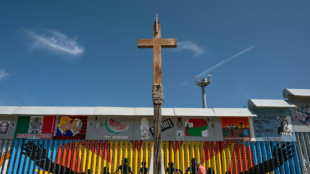
-
 Duplantis kicks off Diamond League amid Johnson-led changing landscape
Duplantis kicks off Diamond League amid Johnson-led changing landscape
-
Taliban change tune towards Afghan heritage sites

-
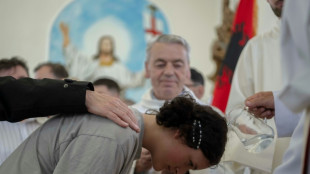 Kosovo's 'hidden Catholics' baptised as Pope Francis mourned
Kosovo's 'hidden Catholics' baptised as Pope Francis mourned
-
Global warming is a security threat and armies must adapt: experts

-
 Can Europe's richest family turn Paris into a city of football rivals?
Can Europe's richest family turn Paris into a city of football rivals?
-
Climate campaigners praise a cool pope

-
 As world mourns, cardinals prepare pope's funeral
As world mourns, cardinals prepare pope's funeral
-
US to impose new duties on solar imports from Southeast Asia

-
 Draft NZ law seeks 'biological' definition of man, woman
Draft NZ law seeks 'biological' definition of man, woman
-
Auto Shanghai to showcase electric competition at sector's new frontier

-
 Tentative tree planting 'decades overdue' in sweltering Athens
Tentative tree planting 'decades overdue' in sweltering Athens
-
Indonesia food plan risks 'world's largest' deforestation
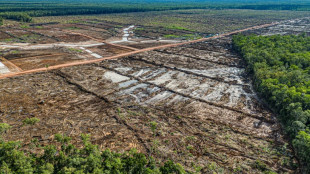
-
 Gold hits record, stocks slip as Trump fuels Fed fears
Gold hits record, stocks slip as Trump fuels Fed fears
-
Trump helps enflame anti-LGBTQ feeling from Hungary to Romania

-
 Woe is the pinata, a casualty of Trump trade war
Woe is the pinata, a casualty of Trump trade war
-
'Like orphans': Argentina mourns loss of papal son

-
 Trump tariffs torch chances of meeting with China's Xi
Trump tariffs torch chances of meeting with China's Xi
-
X rival Bluesky adds blue checks for trusted accounts

-
 China to launch new crewed mission into space this week
China to launch new crewed mission into space this week
-
Morocco volunteers on Sahara clean-up mission

-
 Latin America fondly farewells its first pontiff
Latin America fondly farewells its first pontiff
-
'I wanted it to work': Ukrainians disappointed by Easter truce

-
 Harvard sues Trump over US federal funding cuts
Harvard sues Trump over US federal funding cuts
-
'One isn't born a saint': School nuns remember Pope Francis as a boy

-
 Battling Forest see off Spurs to boost Champions League hopes
Battling Forest see off Spurs to boost Champions League hopes
-
'I don't miss tennis' says Nadal

-
 Biles 'not so sure' about competing at Los Angeles Olympics
Biles 'not so sure' about competing at Los Angeles Olympics
-
Gang-ravaged Haiti nearing 'point of no return', UN warns

-
 US assets slump again as Trump sharpens attack on Fed chief
US assets slump again as Trump sharpens attack on Fed chief
-
Forest see off Spurs to boost Champions League hopes

-
 Trump says Pope Francis 'loved the world,' will attend funeral
Trump says Pope Francis 'loved the world,' will attend funeral
-
Oscar voters required to view all films before casting ballots

-
 Bucks' Lillard upgraded to 'questionable' for game 2 v Pacers
Bucks' Lillard upgraded to 'questionable' for game 2 v Pacers
-
Duplantis and Biles win Laureus World Sports Awards

-
 US urges curb of Google's search dominance as AI looms
US urges curb of Google's search dominance as AI looms
-
The Pope with 'two left feet' who loved the 'beautiful game'

-
 With Pope Francis death, Trump loses top moral critic
With Pope Francis death, Trump loses top moral critic
-
Mourning Americans contrast Trump approach to late Pope Francis

-
 Leeds and Burnley promoted to Premier League
Leeds and Burnley promoted to Premier League
-
Racist gunman jailed for life over US supermarket massacre

-
 Trump backs Pentagon chief despite new Signal chat scandal
Trump backs Pentagon chief despite new Signal chat scandal
-
Macron vows to step up reconstruction in cyclone-hit Mayotte

-
 Gill, Sudharsan help toppers Gujarat boss Kolkata in IPL
Gill, Sudharsan help toppers Gujarat boss Kolkata in IPL
-
Messi, San Lorenzo bid farewell to football fan Pope Francis

-
 Leeds on brink of Premier League promotion after smashing Stoke
Leeds on brink of Premier League promotion after smashing Stoke
-
In Lourdes, Catholic pilgrims mourn the 'pope of the poor'


Farmers in US Midwest struggle amid prolonged drought
Months without rain have left farmers across the vast US Midwest, part of the country's essential "breadbasket," seeing crop yields in freefall, with some fields too damaged to harvest.
At the 4,000-acre (1,600-hectare) Tucker Farms in Venango, Nebraska, "we were only able to harvest... around 500" acres, most of it wheat, said Rachel Tucker.
Much of the rest had shriveled up under a relentlessly hot sun.
The drought has attracted grasshoppers, which threatened the flowers the Tuckers also grow -- until they brought in praying mantises to control the winged pests.
If the American West has been suffering through water shortages for years, the Midwest has not seen conditions this bad since 2012.
"It's even worse than 2012," said Tucker. "Much worse."
Her husband, whose grandfather farmed these same fields, says things have not been this bad since the so-called Dust Bowl days of the 1930s.
The story is just as grim to the south, in western Kansas.
"I was catching up with some older farmers this morning," said Marc Ramsey, whose family has farmed near the small town of Scott City for nearly a century.
"Guys that are in their 70s and 80s are saying, you know, they haven't even experienced anything like this in their lifetime. So it's pretty bad."
Rainfall has been almost nonexistent since late July, he said. Two inches "was all we've had, basically all year."
Rex Buchanan, director emeritus of the Kansas Geological Survey, said one thing seems different from the dry years of 2010-2012: "It seems like when the rain shut off, it just completely shut off."
- Dwindling groundwater -
Drought has hit the three major US crops: wheat, corn and soybeans, and the US Department of Agriculture recently had to lower its nationwide yield predictions.
Along With Kansas and Nebraska, the Midwestern state of South Dakota has also been hard-hit.
In normal times, these three states provide one-third of US winter wheat production, and one-fourth of the corn output.
Approximately 30 percent of Marc Ramsey's land is irrigated and, meaning that portion is doing better than his other fields. Tucker Farms' single irrigated field also fares better than the others.
But even some of Ramsey's irrigated fields are producing only 80 bushels of corn per acre, less than half the usual rate.
High levels of water usage have led to "pretty dramatic declines" in aquifers across western Kansas, Buchanan said, adding that farmers in some areas "have really struggled."
"They’ve seen some wells go dry. They’ve had to return to dryland farming," meaning without irrigation.
- 'You just worry' -
With water rights strictly limited, Buchanan said some farmers have banded together in agreements on more cautious use of subterranean water, drawing as much as 20 percent less than permitted.
Ramsey, like the Tuckers, carries crop insurance covering exceptional losses.
But a year like 2022 can push up premiums, which were already rising due to increased commodity costs.
Insurance "covers your cost of productivity, for the most part," Ramsey said. "And so we'll be here next year and try it again."
But insurance doesn't refill dwindling aquifers -- something that autumn rains usually take care of.
The lack of soil moisture "will be a concern going forward into winter and next spring without a change in what we are currently seeing," said Brian Fuchs, a climatologist with the National Drought Mitigation Center at the University of Nebraska-Lincoln.
Though Buchanan says that "there’s certainly an awareness (among farmers) about climate change," despite the political sensitivity of the subject in the United States.
Farming is always difficult and unpredictable work -- and in years like this, said farmer Rachel Tucker, "you just worry about the suicide rate."
"So I'm hoping that everybody can stay in high spirits, and hope for the best next year."
C.Kovalenko--BTB


